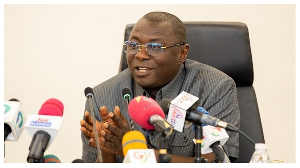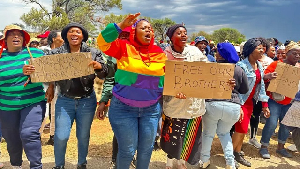To avert road fatalities, especially those involving children, Vivo Energy Ghana (VEG) has organised its second annual refresher training programme for facilitators from selected schools along busy and high risk roads in Accra, to empower them to educate the school children on accident prevention measures. The programme, dubbed “My Road Safety, My Life”, which was launched last year, was born following worrying data from the National Road Safety Commission (NRSC) that between January and February 2015, 254 lives were lost through road accidents in the Greater Accra Region alone.
Although the figure is a 32% reduction in road fatalities, as compared to 377 people killed in 2014 within the same period, VEG believes that the figures can still be reduced significantly in the region.
Addressing the programme last Wednesday, Mr. Ebenezer Faulkner, Managing Director of VEG, said the oil company’s interest to protect children from road accidents was because 23% out of 42% of pedestrians killed by vehicles are children under age sixteen.
“Children between the ages of 4 and 9 are most likely to be involved in fatal road traffic accidents. Pedestrians mostly get knocked down when they are in the process of crossing the road,” he said.
The situation, he noted, must concern everyone to partner the NRSC and Ghana Education Service to advance road safety education among school children. He stated that it was in the light of this that Vivo Energy Ghana had put in place the “Catch them young” strategy, with the hope to get the children learning about road safety at an early age, so as to make them safe and responsible in their later lives.
“To demonstrate our commitment to the safety of our children on the road, Vivo Energy Ghana, as part of its annual safety day celebrations last year, funded the construction of speed ramps, re-painting of faded road markings (Zebra crossings, stop and pedestrians lines), and mounted lollipop stands on the Atta Mills High Street,” Mr. Faulkner added.
Since the introduction of the strategy last year, no casualty has been reported in the selected schools, he explained.
National Road Safety Commission The Greater Accra Regional Manager of the NRSC, Mr. Daniel Wuaku, commended the programme and called on VEG to extend it to other regions.
He said, in May 2011, Ghana joined other countries in the United Nations to launch the Decade of Action for Road Safety programme, with the goal to reduce the global road traffic crash casualty situation by 50% by the year 2020.
He noted that though Ghana has put in place measures to avert these incidents, road accidents continue to be prevalent in the country. Figures from the NRSC show that in 2014, 2,856 people, including children, died from road accidents.
The figures further shows that most of these accidents occurred on the Odorkor, Madina, Tesano, the N1, Awoshie-Pokuase highways and Tema-Accra Motorway. Regrettably, however, most of the children killed on these roads are very familiar with the streets, but they are mostly knocked down when they attempt to cross over, he noted.
“These crashes and deaths, regrettably, translate into far larger consequences of family grief, loss of productivity and parental care, damage to property, rise in medical cost and life-long disabilities, leading to an increase in the dependency burden, and ultimately, poverty,” he underscored.
Mr. Wuaku urged individuals, organisations, NGOs, institutions, churches, and schools among others to make road safety their business, as the government alone cannot do it all.
Regional News of Thursday, 23 April 2015
Source: The Chronicle
















